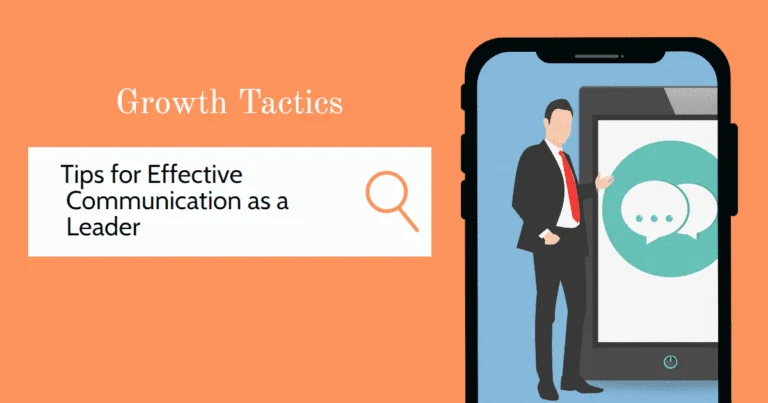Effective leadership communication is a must-have skill. It helps you build trust with your team and boosts engagement, productivity, and motivation. If you want to be an effective leader, it is important to improve your communication skills. In this article, we will share tips that will help make your conversations more effective.
Jump To Section
What is Leadership Communication?

Leadership communication is the process of conveying ideas, information, and meaning. It involves a lot more than just speaking.
Leadership communication requires a great deal of listening. In order for you to communicate effectively, you have to know what your audience needs to hear from you. What they want to know or understand about the topic at hand. You also need to employ active listening skills in order to understand their reactions as they engage with what you’re saying.
In addition, leadership communication involves more than just talking and listening.
It also includes visual cues such as gestures and facial expressions (and other nonverbal forms of communication). These can further help clarify your message by offering additional context for those who are hearing it.
How Effective Leadership Communication Builds Trust

Effective leadership communication builds trust. Trust allows you to be more open, vulnerable, honest, authentic, transparent, and human. When you have good relationships with your team members they will know that they are safe with you. They can tell the truth because they know that it won’t be used against them later on.
Signs of Effective Communication Skills
There are a few signs that can help you determine if your communication is working. If you’re not getting what you want, it may be because of how you’re communicating.
- Are people in the organization following your lead?
- Do they respect and trust what’s coming out of your mouth? If not, then maybe it’s time to take a look at how effectively you’re communicating with them.
- Are there holes in what needs to get done?
- Do people just assume things will work themselves out?
This is sometimes caused by ineffective communication. Too many cooks in the kitchen or too much information floating around means no one knows who has their finger on the pulse of things or where to look for answers when needed. These are all signs that point to some type of breakdown somewhere along the line and if nothing else, this indicates that there might be room for improvement when it comes to communicating effectively throughout an organization or team!
Good communication improves engagement

You should be communicating with your team on a regular basis. You don’t have to say much, but you do need to say something. Good communication is the foundation of trust, engagement, and team performance. The fact that it is so important makes it all the more important that you are doing it right!
But how exactly do you go about this? What steps can be taken? Here are some tips for effective communication as a leader.
Tips for effective communication as a leader
- Communicate Clearly
- Ask Open-ended Questions
- Open Body Language
- Adapt
- Know Your Strengths and Weaknesses
- Be Conversational
Communicate clearly, simply, and frequently
As a leader, you have to communicate clearly, simply, and frequently. Here’s how:
- Be clear about your message. It’s important that you get your point across in a way that is easy for others to understand.
- Be simple in your language. Use everyday words and sentences that are easy for others to understand. You don’t have to use big words or complex sentence structures to make your point. Just be clear about what you mean.
- Be frequent in your communications. You don’t have to send out a message every day, but you do need to establish regular contact with the people around you. If they don’t hear from you often enough, they’ll start wondering what’s going on and whether they should bother doing anything at all.
Ask open-ended questions
One of the most important things you can do is ask open-ended questions. This means asking questions that require more than a yes or no answer and that help the other person think, understand, and get to the heart of what you are trying to talk about.
An example: “What do you mean by that?” followed by “How did it happen?”
Another example: “What could be better about this situation?” followed by “How would it change if…”
Have Open Body Language

We all know that body language is powerful, and it’s important to be aware of what your body language is saying to others. If you are going to communicate effectively as a leader, it’s crucial that you have open body language.
If you’re standing with your shoulders hunched over and your arms crossed on top of them, it will likely make people feel like they can’t approach you or talk about what they need help with. If someone feels like this when talking to a leader, then they won’t get much done!
Instead, try keeping a good posture so that people feel comfortable approaching and making eye contact while speaking (but not staring). You could also consider using hand gestures here and there during conversations if appropriate. Like pointing at something or gesturing with both hands when explaining something complex.
Adapt Your Communication Style
There are many factors to consider when adapting your communication style. As you take in different cultural differences, remember that everyone has a unique personality and perspective on life. Each person is also influenced by their own beliefs, values, and emotions. Which may differ from yours.
Be flexible and adjust your approach based on the type of group you’re communicating with. For example, if you’re speaking at an event where everyone knows each other already (like at a family gathering), then it’s okay to get more informal or less formal than usual.
However, this same rule doesn’t necessarily apply if there’s someone who isn’t familiar with everyone else in attendance. Or if they aren’t comfortable being part of such an intimate setting right away (maybe because they haven’t been invited before). In this case, it might make sense for them not only to hear what was said during introductions but also to speak up themselves so others know who they are too!
Another thing worth considering when adapting your communication style is whether or not there will be any visual aids used while delivering messages during presentations. Such as slideshows or diagrams.
Know your strengths and weaknesses
When you know your strengths and weaknesses, it’s easier to communicate effectively as a leader.
Learn how to listen to feedback from others. Feedback is an important part of improving leadership skills and communication effectiveness, but many people don’t take the time to seek it out or actively solicit feedback from their team members. Asking for feedback can be difficult at first. It requires some vulnerability on both sides, so it’s important not only that you ask but also that you’re open and receptive when someone gives you constructive criticism (even if it stings!).
Know your own communication style. Your communication style may be very direct or indirect. or anything in between! And this will likely have an effect on the way others perceive your messages. When you know what type of message works best for each person within an organization, there’s less room for miscommunication or misunderstanding.
Be Conversational

Be conversational while talking to others. This means talking with others and not at them. Be sure to use the person’s name when addressing them. This will help you connect with them and keep their attention on what you’re saying. It also shows that you care about what they’re saying, which makes people more likely to listen to your message.
Improving Your Leadership Communication Skills
Effective communication is a cornerstone of great leadership. Enhancing your skills in this area is a continual process. Here’s how you can become a more proficient communicator in a leadership role.
Take a Leadership Communication Course
- Enroll in a Communication Course: Investigate courses that specialize in communication or leadership. These programs offer structured learning and can provide new insights into effective communication strategies.
- Find a Mentor: Seek out a leader renowned for their communication abilities. A mentor can offer personalized advice and examples from their own experiences.
Practice Active Listening
- Engage in Active Listening: Pay close attention to what others are saying. Active listening involves being fully present in conversations, without formulating a response while the other person is still speaking.
- Ask Clarifying Questions: Before providing your input, make sure you thoroughly understand the issue. Inquire further to confirm your understanding and demonstrate your interest in others’ perspectives.
Keep Communication Clear and Direct
- Be Concise: Get straight to the point without veering off topic. Clarity saves time and prevents misunderstandings.
- Avoid Jargon: Eschew technical language that might confuse team members not familiar with the terminology.
- Eliminate Filler Words: Cut out “um,” “like,” and similar fillers that can make your communication seem less confident and more convoluted.
By implementing these tips, you can make strides in improving your communication as a leader, leading to stronger trust and relationships with your team.
Conclusion
As you can see, good communication skills are important for leaders. Effective communication can help you build trust, improve engagement and teamwork, and even make your teams more productive. You don’t need to be able to remember every single word that came out of someone else’s mouth in order to lead them effectively. You just need the right approach.
That said, remember that all forms of communication are imperfect by nature. Sometimes there will be misunderstandings or miscommunications even when we do everything right! But as long as everyone is aware that this might happen from time to time (and knows how best to handle it), then it should not be a problem.
Did you find this article on communicating as a leader useful? Please share and subscribe below.


